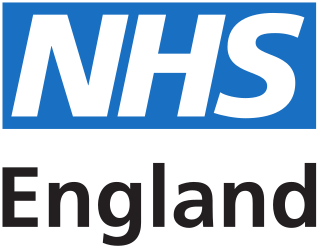Related Research Articles

NHS Scotland, sometimes styled NHSScotland, is the publicly–funded healthcare system in Scotland and one of the four systems that make up the National Health Service in the United Kingdom. It operates 14 territorial NHS boards across Scotland, supported by seven special non-geographic health boards, and Public Health Scotland.
Sir Robert Alan Langlands is a former vice-chancellor of the University of Leeds. He is notable for past service as the fourth chief executive of the National Health Service executive in England (1994–2000), as principal and vice-chancellor of the University of Dundee (2000–2009), and Chief Executive of the Higher Education Funding Council for England (2009–2013).

Healthcare in the United Kingdom is a devolved matter, with England, Northern Ireland, Scotland and Wales each having their own systems of publicly funded healthcare, funded by and accountable to separate governments and parliaments, together with smaller private sector and voluntary provision. As a result of each country having different policies and priorities, a variety of differences have developed between these systems since devolution.
The Nuffield Trust, formerly the Nuffield Provincial Hospitals Trust, is a charitable trust with the mission of improving health care in the UK through evidence and analysis.

Nuffield Health is the United Kingdom's largest healthcare charity. Established in 1957 the charity operates 31 Nuffield Health Hospitals and 112 Nuffield Health Fitness & Wellbeing Centres. It is independent of the National Health Service and is constituted as a registered charity. Its objectives are to 'advance, promote and maintain health and healthcare of all descriptions and to prevent, relieve and cure sickness and ill health of any kind, all for the public benefit.'
The Nuffield Council on Bioethics is a UK-based independent charitable body, which examines and reports on bioethical issues raised by new advances in biological and medical research. Established in 1991, the Council is funded by the Nuffield Foundation, the Medical Research Council and the Wellcome Trust. The Council has been described by the media as a 'leading ethics watchdog', which 'never shrinks from the unthinkable'.
Y Touring Theatre Company was a national touring theatre company which produced original plays and debates exploring contemporary issues. It was founded in 1989 by Nigel Townsend. The company was based in Kings Cross, London, England and was a former operation of Central YMCA.

The UCL Great Ormond Street Institute of Child Health (ICH) is an academic department of the Faculty of Population Health Sciences of University College London (UCL) and is located in London, United Kingdom. It was founded in 1946 and together with its clinical partner Great Ormond Street Hospital (GOSH), forms the largest concentration of children's health research in Europe. In 1996 the Institute merged with University College London. Current research focusses on broad biomedical topics within child health, ranging from developmental biology, to genetics, to immunology and epidemiology.

Vice Admiral Sir David George Steel, is a retired senior Royal Navy officer who served as Second Sea Lord between 2012 and 2015. He served as Governor of Gibraltar from 2020 to 2024.

Sir Ernest Nigel Ryder, became a Lord Justice of Appeal in April 2013 and was appointed Senior President of Tribunals in September 2015. In July 2020, Ryder became the Master of Pembroke College, Oxford.

NHS England, formerly the NHS Commissioning Board, is an executive non-departmental public body of the Department of Health and Social Care. It oversees the budget, planning, delivery and day-to-day operation of the commissioning side of the National Health Service in England as set out in the Health and Social Care Act 2012. It directly commissions NHS general practitioners, dentists, optometrists and some specialist services. The Secretary of State publishes annually a document known as the NHS mandate which specifies the objectives which the Board should seek to achieve. National Health Service Regulations are published each year to give legal force to the mandate.
The various academic faculties, departments, and institutes of the University of Oxford are organised into four divisions, each with its own Head and elected board. They are the Humanities Division; the Social Sciences Division; the Mathematical, Physical and Life Sciences Division; and the Medical Sciences Division.
John Appleby, FAcSS is a British economist. He was chief economist at the King's Fund from 1998 to 2016 and is now Director of Research and Chief Economist at the Nuffield Trust.
Dame Carol Propper is Professor of Economics at Imperial College Business School, Professor of Economics of Public Policy at Bristol University, and Professor of Health Economics at Monash University. She is also a senior research associate with the Nuffield Trust, and has served on the Economic and Social Research Council Research Grants Board.
David Oliver is a British physician specialising in the geriatric medicine and acute general internal medicine. He was President of the British Geriatrics Society from 2014 to 2016. He is Visiting Professor of Medicine for Older People in the School of Community and Health Sciences at City University London and a King's Fund Senior Visiting Fellow. He was formerly the UK Department of Health National Clinical Director for Older People's Services from 2009 to 2013. He is a researcher, writer, teacher and lecturer on services for older people and a regular blogger, columnist and media commentator. He was elected as Clinical Vice President of the Royal College of Physicians, London. In April 2022 he was elected as president of the Royal College of Physicians but withdrew in July 2022 after he had contracted Covid 19 and "no longer felt able to do it justice".
Transforming Community Services was a programme in the English NHS which operated from 2008 at a national level and continued during the implementation of the Health and Social Care Act 2012. Although the rhetoric of the programme was about improving the quality of community services the reality was mostly concerned with structural changes.
Professor Nick Harding OBE BSc FRCGP FRCP HonMFPH DRCOG DOccMed PGDIP (Cardiology) SFFLM, born 21 December 1969, is a British general practitioner and Chief Medical Officer at Operose Health.
Nicholas James Maxwell Timmins is a British author and journalist who writes about the welfare state and the National Health Service.
Dame Jennifer Dixon is the chief executive of the Health Foundation, a large independent charity in the United Kingdom. Her work has been recognised by several national and international bodies for her significant impact in driving national health policy making.
As part of the British honours system, Special Honours are issued at the Monarch's pleasure at any given time. The Special Honours refer to the awards made within royal prerogative, operational honours, political honours and other honours awarded outside the New Years Honours and Birthday Honours.
References
- ↑ Barnes, Sopie (7 January 2014). "Nigel Edwards to head Nuffield Trust". Health Service Journal . Retrieved 26 December 2014.
- ↑ "Nigel Edwards". Nuffield Trust. Retrieved 26 December 2014.